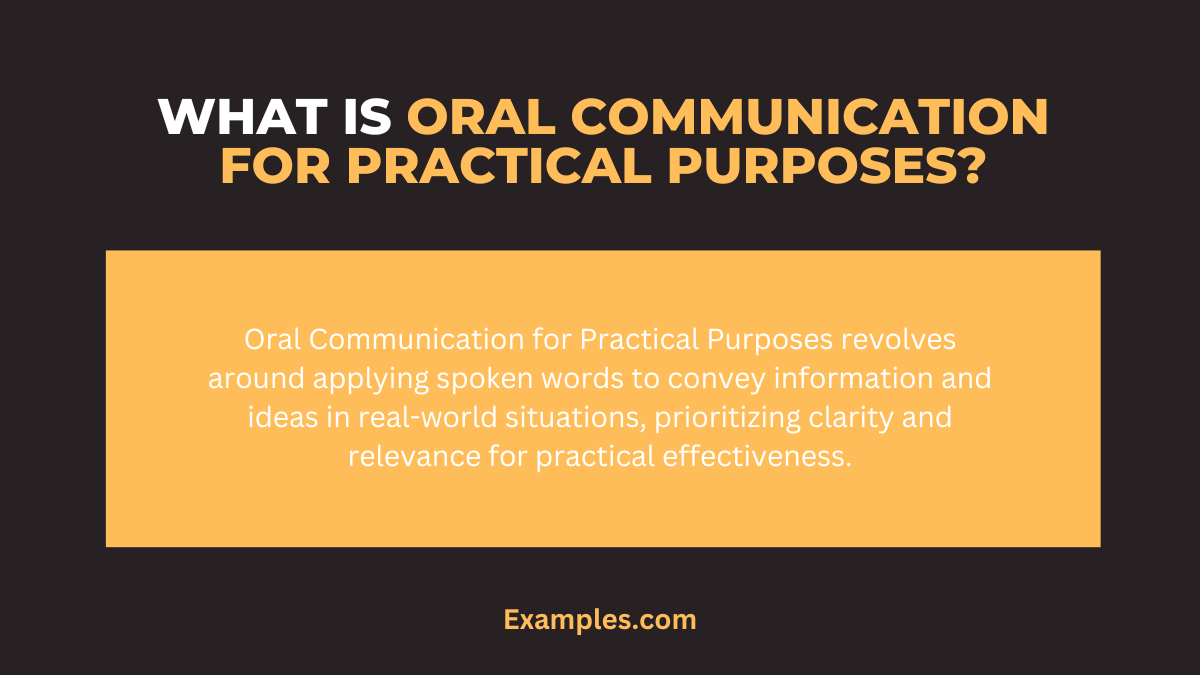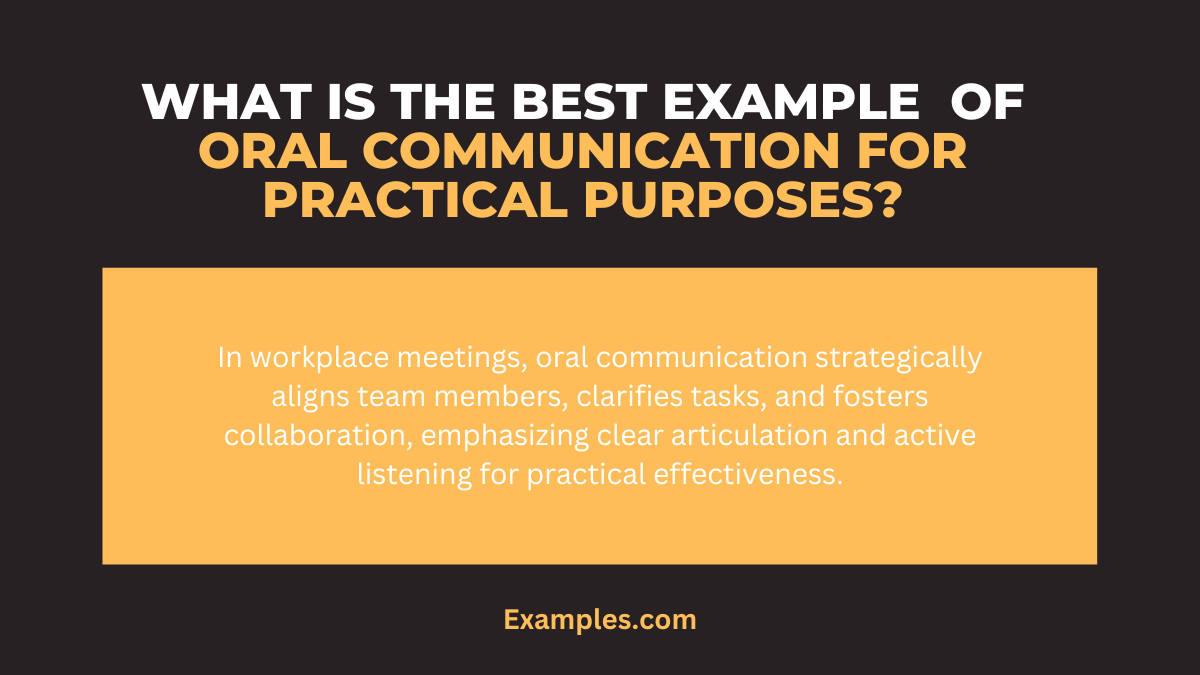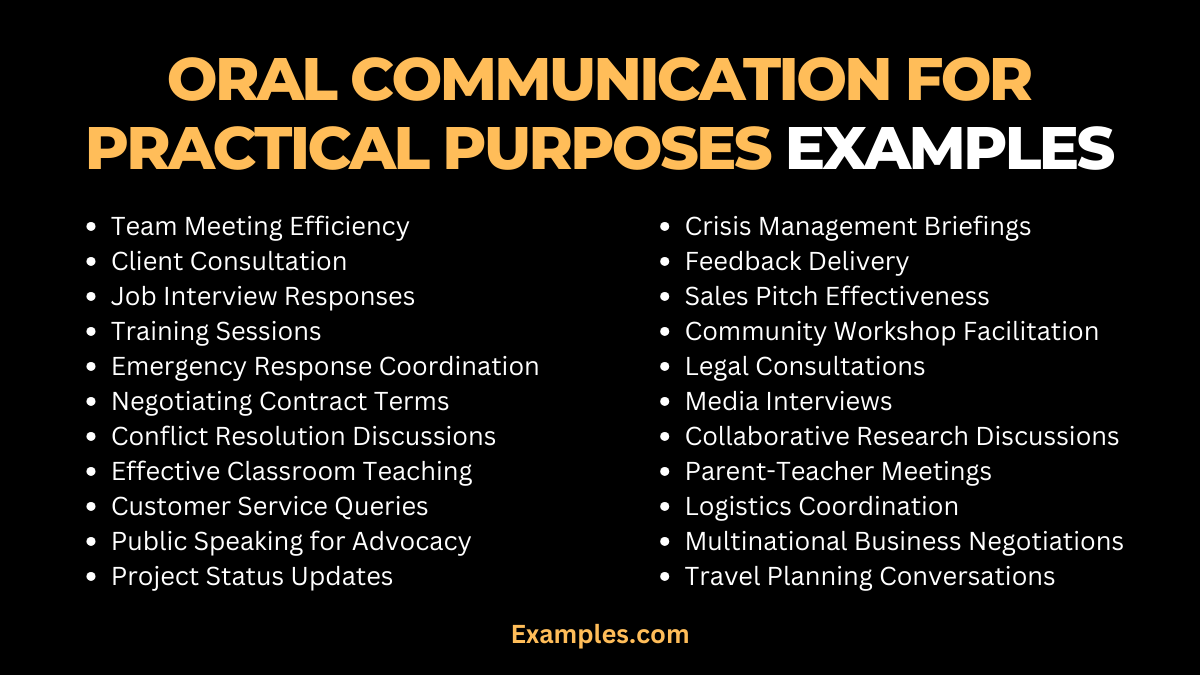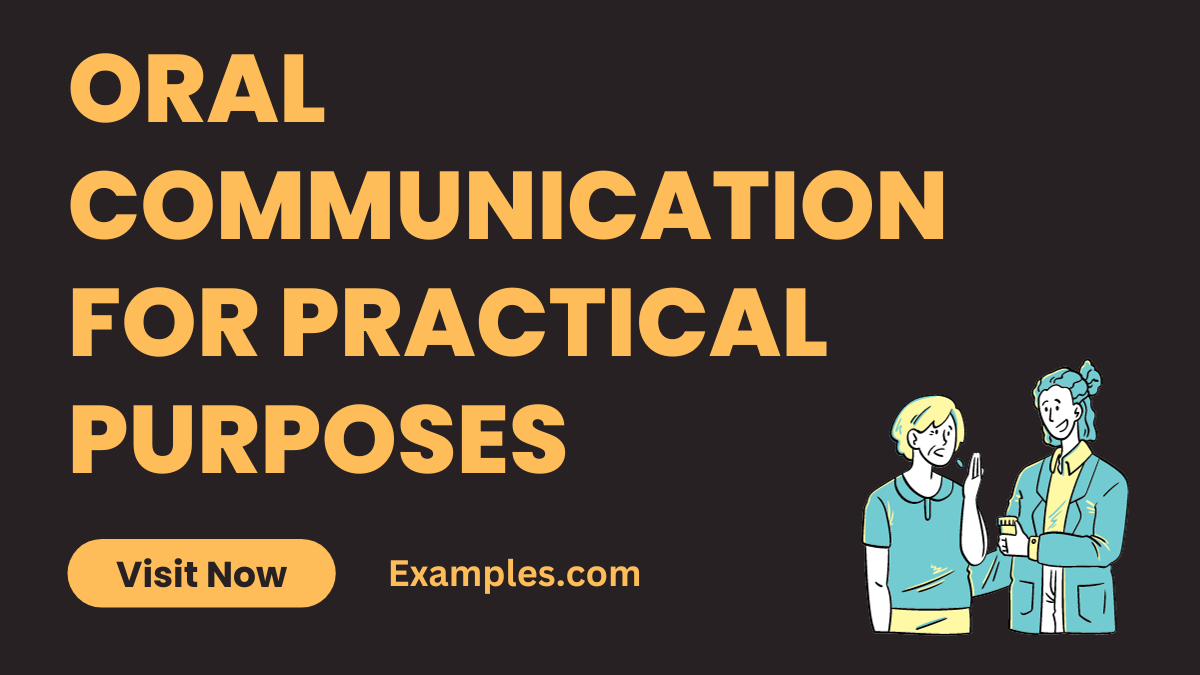29+ Oral Communication for Practical Purposes Examples
Unlock the dynamic realm of Oral Communication for Practical Purposes with our comprehensive guide! Dive into practical examples that illuminate the essence of effective communication in various scenarios. From workplace interactions to specialized fields, this guide offers insights and Communication Examples that empower you with actionable skills. Explore the significance, benefits, and strategies to create impactful campaigns. Elevate your practical communication prowess with expert tips and real-life applications, ensuring success in diverse settings. Embrace the power of communicative excellence in every practical endeavor.
What is Oral Communication for Practical Purposes?

Oral Communication for Practical Purposes involves the exchange of information, ideas, and messages through spoken words, tailored for real-world applications. It extends beyond theoretical discourse, focusing on pragmatic scenarios where effective communication is vital. This form of interaction serves the practical needs of specific fields, emphasizing clarity, relevance, and actionable insights.
What is the Best Example of Oral Communication for Practical Purposes?

An exemplary instance is the workplace meeting, a crucial forum where teams discuss project updates, strategies, and goals. In this setting, oral communication serves the practical purpose of aligning team members, clarifying tasks, and fostering collaborative efforts. Clear articulation, active listening, and concise expression ensure that practical objectives are met through effective verbal exchange.
30 Oral Communication for Practical Purposes Examples

- Team Meeting Efficiency: Ensuring clear agendas and concise updates in team meetings enhances project coordination and efficiency.
- Client Consultation: Skillfully extracting client requirements through verbal communication tailors solutions to their specific needs.
- Job Interview Responses: Crafting articulate responses during interviews showcases professionalism and boosts job prospects.
- Training Sessions: Explaining complex concepts verbally during training sessions aids comprehension and skill development.
- Emergency Response Coordination: Communicating critical information swiftly is vital for coordinating effective responses during emergencies.
- Negotiating Contract Terms: Persuasive verbal negotiation skills lead to mutually beneficial agreements in various business transactions.
- Conflict Resolution Discussions: Verbal dialogue is essential for resolving conflicts, finding common ground, and maintaining positive relationships.
- Effective Classroom Teaching: Engaging students through clear verbal explanations enhances learning outcomes in academic settings.
- Customer Service Queries: Addressing customer inquiries with clear oral communication contributes to positive customer experiences.
- Public Speaking for Advocacy: Impactful speeches are a powerful tool for advocating and driving practical change in society.
- Project Status Updates: Regularly updating stakeholders verbally ensures transparency and practical decision-making in project management.
- Crisis Management Briefings: Clear oral communication is crucial for informing stakeholders and implementing practical solutions during crises.
- Feedback Delivery: Providing constructive feedback verbally fosters practical improvement and skill development.
- Sales Pitch Effectiveness: Persuasive oral communication is key to influencing practical buying decisions and closing successful sales.
- Community Workshop Facilitation: Leading workshops with effective oral communication enhances practical learning and community engagement.
- Legal Consultations: Attorneys use oral communication to explain legal matters clearly and guide clients through practical solutions.
- Medical Consultations: Effective communication between healthcare professionals and patients ensures accurate diagnosis and practical treatment plans.
- Media Interviews: Articulate responses in media interviews are essential for conveying messages clearly and influencing public perceptions.
- Collaborative Research Discussions: Verbal communication is vital in research settings to share findings, collaborate on projects, and discuss practical implications.
- Parent-Teacher Meetings: Open and clear verbal communication between teachers and parents fosters a practical understanding of a student’s progress.
- Logistics Coordination: In logistics, oral communication ensures smooth coordination between teams, drivers, and stakeholders, facilitating practical supply chain management.
- Multinational Business Negotiations: Effective verbal communication is crucial in international business negotiations to bridge cultural gaps and achieve practical agreements.
- Travel Planning Conversations: When planning trips, verbal communication helps discuss practical details, preferences, and logistics with travel companions.
- Human Resources Consultations: Verbal communication is essential in HR consultations for addressing employee concerns, providing guidance, and facilitating practical solutions.
- Board Meeting Presentations: Clearly presenting information in board meetings through oral communication is vital for decision-making and implementing practical strategies.
- Community Planning Discussions: Oral communication is crucial in community planning to discuss and implement practical solutions for infrastructure and development.
- Networking Events: Verbal interactions at networking events are essential for building connections, discussing practical collaborations, and exploring opportunities.
- Artistic Collaboration Discussions: In the arts, clear verbal communication is key to discussing creative concepts and coordinating practical aspects of collaborative projects.
- Social Work Case Conferences: Verbal communication in social work case conferences is essential for discussing practical solutions and intervention strategies.
- Entrepreneurial Pitching: Entrepreneurs use verbal communication to pitch ideas persuasively, attracting investors and securing practical support for their ventures.
Oral Communication for Practical Purposes at Work Examples
In the workplace, effective oral communication is indispensable for achieving practical goals. This involves conveying information, addressing concerns, and collaborating seamlessly. Here are examples illustrating the practical use of oral communication in a professional setting:
- Team Meetings: Engaging in team meetings allows employees to share ideas, discuss projects, and devise practical strategies for achieving objectives.
- Client Presentations: Delivering clear and persuasive client presentations is crucial for conveying practical solutions, gaining trust, and securing business partnerships.
- Performance Feedback Discussions: Providing constructive feedback orally helps employees understand practical areas for improvement and fosters professional development.
- Project Briefings: Verbal communication in project briefings ensures that team members comprehend tasks, timelines, and practical expectations for successful project completion.
- Conflict Resolution Conversations: Addressing conflicts through oral communication enables practical resolution, restoring harmony and maintaining a productive work environment.
- Training Sessions: Conducting training sessions orally allows for the practical transfer of knowledge, skills, and procedures to enhance employee capabilities.
- Employee Onboarding Talks: Orally communicating company policies, expectations, and practical details during onboarding facilitates a smooth integration process for new hires.
- Teleconferencing: In remote work setups, teleconferencing facilitates practical discussions, decision-making, and collaboration among geographically dispersed teams.
- Emergency Response Briefings: Oral communication is essential during emergency response briefings to convey practical procedures, ensuring a swift and coordinated reaction.
- Sales Pitches: Delivering effective sales pitches involves persuasive verbal communication, highlighting the practical benefits of products or services to potential clients.
Oral Communication for Practical Purposes in a Particular Field Examples
In specific fields, tailored oral communication serves practical purposes unique to that domain. Here are examples showcasing the practical application of oral communication in distinct fields:
- Legal Consultations: Lawyers employ oral communication to provide practical legal advice, explain case details, and guide clients through legal processes.
- Educational Workshops: Facilitators in educational workshops use oral communication to impart practical knowledge, share insights, and engage participants in interactive learning.
- Architectural Design Discussions: In architecture, discussing design concepts orally helps convey practical considerations, aesthetic choices, and project requirements.
- Medical Consultations: Effective communication between healthcare professionals and patients ensures accurate diagnosis and practical treatment plans.
- Media Interviews: Articulate responses in media interviews are essential for conveying messages clearly and influencing public perceptions.
- Collaborative Research Discussions: Verbal communication is vital in research settings to share findings, collaborate on projects, and discuss practical implications.
- Parent-Teacher Meetings: Open and clear verbal communication between teachers and parents fosters a practical understanding of a student’s progress.
- Logistics Coordination: In logistics, oral communication ensures smooth coordination between teams, drivers, and stakeholders, facilitating practical supply chain management.
- Multinational Business Negotiations: Effective verbal communication is crucial in international business negotiations to bridge cultural gaps and achieve practical agreements.
- Travel Planning Conversations: When planning trips, verbal communication helps discuss practical details, preferences, and logistics with travel companions.
What is the Practical Importance of Oral Communication?
Oral communication holds immense practical importance across various contexts. In professional settings, it facilitates efficient information exchange, enhances collaboration, and ensures clarity in conveying complex ideas. Additionally, in personal interactions, verbal communication fosters understanding, resolves conflicts, and strengthens relationships. Its practical significance lies in its ability to convey emotions, intentions, and nuanced messages, contributing to effective communication in diverse practical scenarios.
What are the Practical Benefits of Oral Communication?
- Clarity and Understanding: Verbal communication ensures a clear exchange of ideas, reducing the risk of misunderstandings and promoting effective comprehension.
- Real-time Feedback: Immediate verbal interactions allow for instant feedback, aiding in timely adjustments and ensuring practical alignment with goals.
- Enhanced Collaboration: Practical benefits include improved teamwork, as oral communication fosters collaboration, idea sharing, and joint problem-solving.
- Conflict Resolution: Verbal communication plays a pivotal role in addressing conflicts, facilitating open discussions, and finding practical resolutions.
- Quick Decision-Making: The dynamic nature of oral communication enables swift decision-making, vital for practical responses to evolving situations.
Tips for Effective Oral Communication for Practical Purposes?
- Clarity is Key: Clearly articulate your thoughts, ensuring your message is easily understandable in practical contexts.
- Active Listening: Practice active listening to grasp practical details, respond appropriately, and demonstrate genuine engagement.
- Tailor Communication: Adapt your communication style to the practical needs of the audience, considering their background, knowledge, and preferences.
- Use Visual Aids: Supplement oral communication with visual aids for practical reinforcement, especially when conveying complex information.
- Engage in Two-way Communication: Foster practical dialogue by encouraging questions, feedback, and active participation from others.
In conclusion, oral communication serves as an indispensable tool for practical applications in various fields, from workplace interactions to specialized scenarios. Its significance lies in its ability to convey clear, relevant, and actionable information, essential for effective collaboration, decision-making, and problem-solving. To further enhance your understanding and application of effective oral communication, here are two additional resources.



